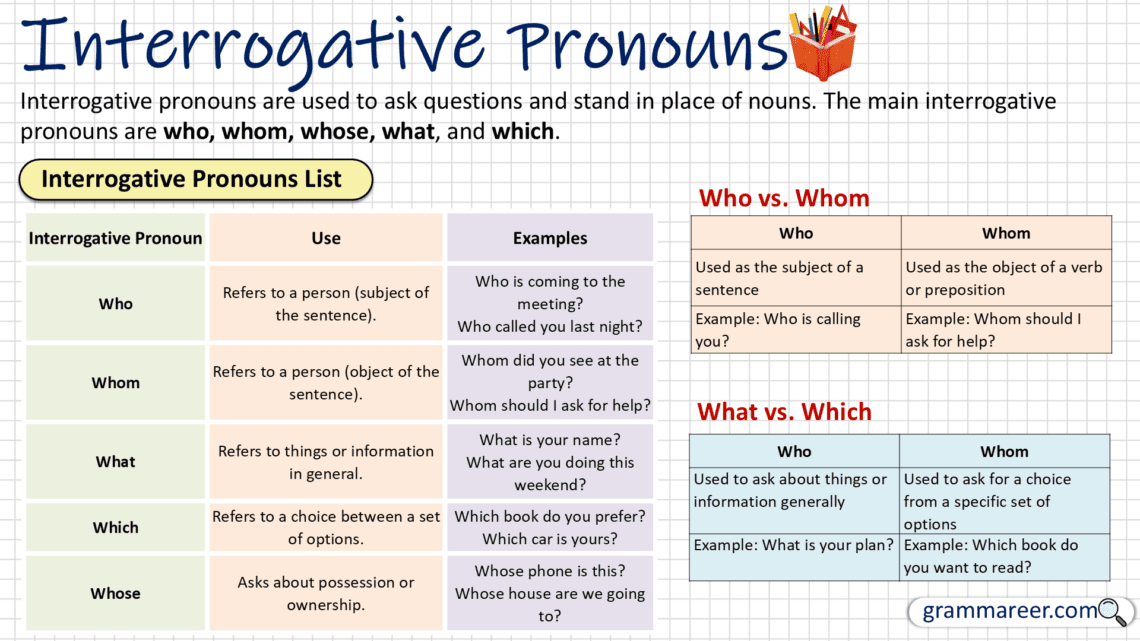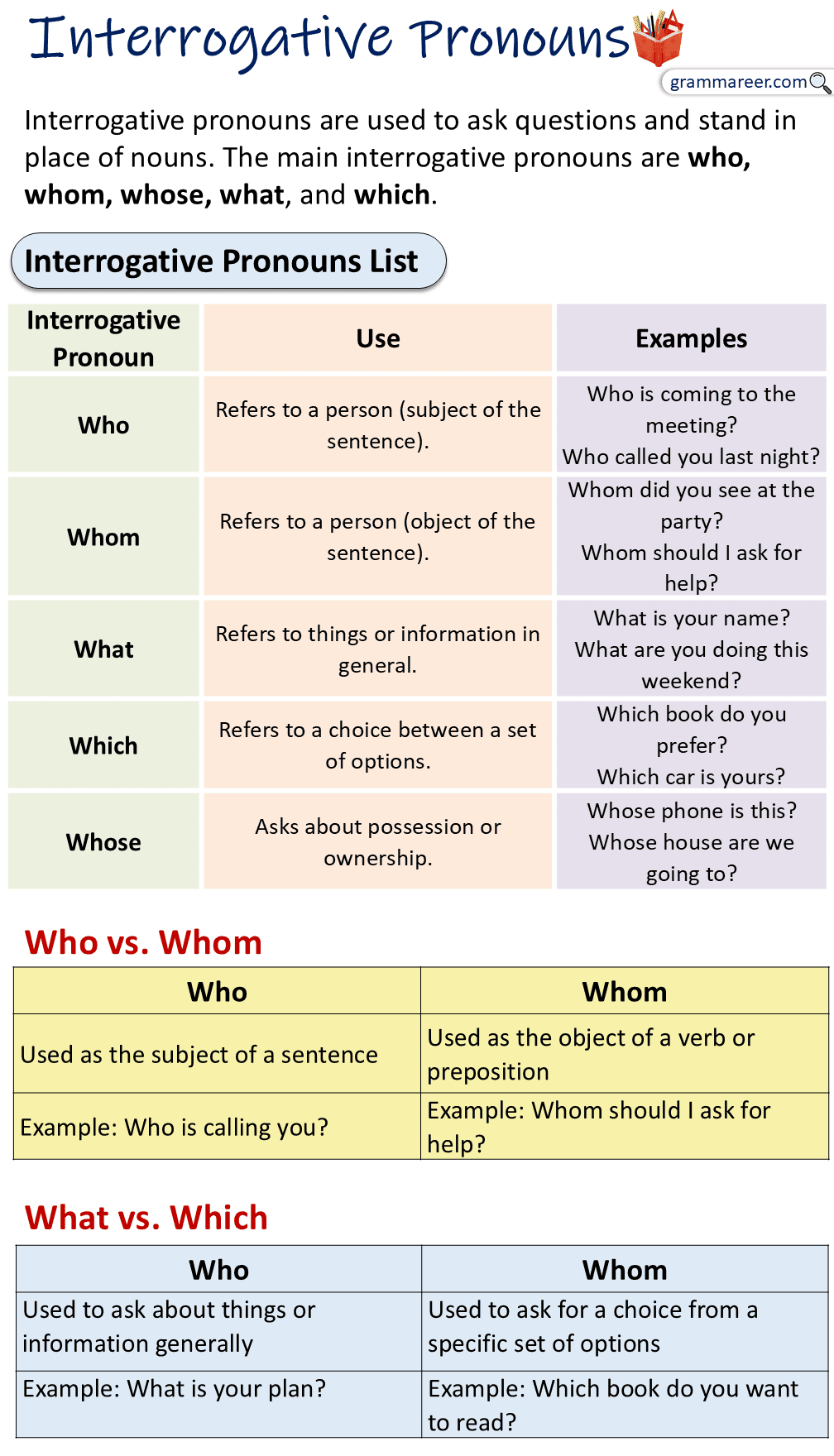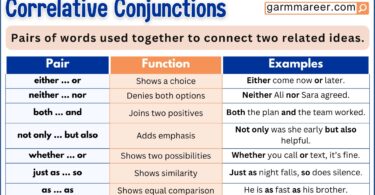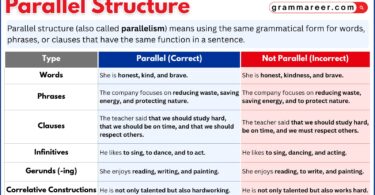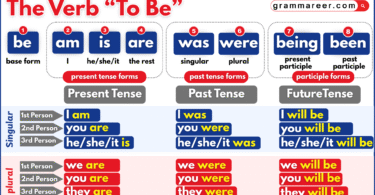Interrogative pronouns are an essential part of English grammar, used to ask questions. They allow us to inquire about people, places, things, or ideas without directly mentioning them. Understanding how to use these pronouns correctly is important for effective communication, especially when forming questions.
Table of Contents
What Are Interrogative Pronouns?
Interrogative pronouns are pronouns used to ask questions. They stand in for the noun that we are inquiring about, replacing the unknown person or thing in a sentence. These pronouns are essential in forming questions and gaining information. The five interrogative pronouns are what, which, who, whom, and whose. Let’s explore each of these pronouns in detail:
- Who – “Who” is used to ask questions about the subject of a sentence, typically referring to people. It is widely used in both formal and informal settings.
- Who is coming to the meeting?
- Who won the competition?
Here, “who” replaces the unknown subject (person) we are asking about.
- Whom – “Whom” is used to ask about the object of a verb or preposition. It also refers to people but is not as commonly used today, especially in informal conversation. However, it still appears in formal writing.
- Whom did you invite to the event?
- With whom are you going to the concert?
In both cases, “whom” is referring to the object receiving the action.
- Whose – “Whose” is used to ask questions about possession. It can refer to both people and things.
- Whose jacket is this?
- Whose idea was that?
Here, “whose” is inquiring about ownership.
- What – “What” is used to ask questions about things, ideas, or information. It is general and does not refer to people.
- What is the time?
- What are you working on?
In these examples, “what” is replacing the unknown object or idea.
- Which – “Which” is used to ask questions about a specific choice from a set of options. It can refer to both people and things, but it involves a selection between limited alternatives.
- Which color do you prefer?
- Which of these books is yours?
“Which” helps narrow down the choices and focuses on a specific selection.
| Interrogative Pronoun | Usage | Example |
|---|---|---|
| Who | Refers to the subject, generally people | Who is your teacher? |
| Whom | Refers to the object, less commonly used | Whom did you meet? |
| Whose | Asks about possession | Whose phone is this? |
| What | Asks for information or things | What is your name? |
| Which | Asks for a choice from a specific set of options | Which book do you want to borrow? |
How to Use Interrogative Pronouns in Sentences
Interrogative pronouns are typically placed at the beginning of a question, followed by the verb and subject. Let’s look at how to use these pronouns correctly in various contexts:
- Who: Who gave you the book?
(In this sentence, “who” is asking about the person who gave the book.) - Whom: Whom did you see at the event?
(“Whom” is asking about the person you saw.) - Whose: Whose keys are these?
(“Whose” is asking about the owner of the keys.) - What: What are you planning for the weekend?
(“What” is asking about the activities planned for the weekend.) - Which: Which dessert would you prefer?
(“Which” is asking about a choice between different desserts.)
Who vs. whom
Who and whom are both interrogative pronouns used to ask questions about people. However, their usage depends on the grammatical role they play in a sentence. Here’s a breakdown of how to use who and whom correctly:
- Who is used as a subject pronoun. It refers to the person performing the action in a sentence.
- Who is coming to the party? (Who is the subject performing the action of coming.)
- Who called you last night? (Who is the subject performing the action of calling.)
In both examples, who is asking about the person doing the action.
- Whom is used as an object pronoun. It refers to the person receiving the action.
- Whom did you invite to the party? (Whom is the object receiving the action of being invited.)
- To whom should I send the letter? (Whom is the object of the preposition “to.”)
What vs. which
Both what and which are interrogative pronouns used to ask questions, but they are used in slightly different contexts. Let’s explore the distinction between the two.
- What is used when the options or possibilities are unlimited or not specified. It is often used in more general questions.
- What is your favorite movie?
- What are you doing this weekend?
- Which is used when there is a limited or specific set of choices. It is asking to choose from a particular group or range.
- Which shirt do you want, the blue one or the red one?
- Which way should we go, left or right.
Common Mistakes with Interrogative Pronouns
While interrogative pronouns are simple to understand, learners often make some common mistakes. Let’s review a few of these mistakes and the correct usage.
Using “Whom” Incorrectly
❌ Who did you give the letter to?
✅ Whom did you give the letter to?
“Whom” is required when referring to the object of a verb or preposition.
Confusing “Whose” and “Who’s”
❌ Who’s phone is this?
✅ Whose phone is this?
“Who’s” is a contraction for “who is,” while “whose” refers to possession.
Incorrect Use of “Which”
❌ Which of the two options you want?
✅ Which of the two options do you want?
Ensure that “which” is followed by the correct verb structure.
Read More

